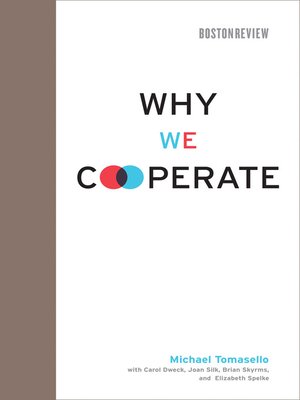
Sign up to save your library
With an OverDrive account, you can save your favorite libraries for at-a-glance information about availability. Find out more about OverDrive accounts.
Find this title in Libby, the library reading app by OverDrive.



Search for a digital library with this title
Title found at these libraries:
| Loading... |
Through experiments with kids and chimpanzees, this cutting-edge theory in developmental psychology reveals how cooperation is a distinctly human combination of innate and learned behavior.
“[A] fascinating approach to the question of what makes us human.” —Publishers Weekly
Drop something in front of a 2-year-old, and she’s likely to pick it up for you. This is not a learned behavior, psychologist Michael Tomasello argues. Through observations of young children in experiments he designed, Tomasello shows that children are naturally—and uniquely—cooperative. For example, apes put through similar experiments demonstrate the ability to work together and share, but choose not to. As children grow, their almost reflexive desire to help—without expectation of reward—becomes shaped by culture. They become more aware of being a member of a group. Groups convey mutual expectations, and thus may either encourage or discourage altruism and collaboration. Either way, cooperation emerges as a distinctly human combination of innate and learned behavior.
In Why We Cooperate, Tomasello’s studies of young children and great apes help identify the underlying psychological processes that very likely supported humans’ earliest forms of complex collaboration and, ultimately, our unique forms of cultural organization, from the evolution of tolerance and trust to the creation of such group-level structures as cultural norms and institutions. Scholars Carol Dweck, Joan Silk, Brian Skyrms, and Elizabeth Spelke respond to Tomasello’s findings and explore the implications.
“[A] fascinating approach to the question of what makes us human.” —Publishers Weekly
Drop something in front of a 2-year-old, and she’s likely to pick it up for you. This is not a learned behavior, psychologist Michael Tomasello argues. Through observations of young children in experiments he designed, Tomasello shows that children are naturally—and uniquely—cooperative. For example, apes put through similar experiments demonstrate the ability to work together and share, but choose not to. As children grow, their almost reflexive desire to help—without expectation of reward—becomes shaped by culture. They become more aware of being a member of a group. Groups convey mutual expectations, and thus may either encourage or discourage altruism and collaboration. Either way, cooperation emerges as a distinctly human combination of innate and learned behavior.
In Why We Cooperate, Tomasello’s studies of young children and great apes help identify the underlying psychological processes that very likely supported humans’ earliest forms of complex collaboration and, ultimately, our unique forms of cultural organization, from the evolution of tolerance and trust to the creation of such group-level structures as cultural norms and institutions. Scholars Carol Dweck, Joan Silk, Brian Skyrms, and Elizabeth Spelke respond to Tomasello’s findings and explore the implications.






